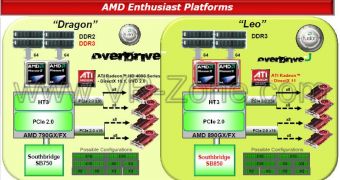Sunnyvale, California-based Advanced Micro Devices, the world's second largest chip manufacturer, is due to update its current desktop platform codenamed Dragon with an upcoming Leo platform, which is reportedly planned for release in April 2010. According to recent details that have surfaced on the Internet, the new platform is going to provide users with faster processors, combined with the chip maker's new line of DirectX-capable Radeon graphics cards.
According to a recent AMD enthusiast platform roadmap that surfaced in a news-article on vr-zone, the world's second largest chip maker is expected to provide its customers with a new line of high-performance products that are going to be part of the company's next-generation desktop platform. Codenamed 'Leo', the new platform will be launched in April next year, providing users with a new line of AM3 45nm processors, which will boast improved performance and multi-core design.
The new AMD Leo platform is expected to feature new 45nm multi-core AM3 processors, due out next year, coupled with the company's new and improved 890FX/GX + SB850 chipset. In addition, AMD enthusiasts will be able to take advantage of the next-generation line of Radeon graphics cards, codenamed Helmlock and Cypress (allegedly part of the Radeon HD 5800 series of GPUs), which will boast support for Microsoft's next-generation DirectX 11 API. The new chipset is reportedly going to deliver improved performance through the integration of new features, including better CrossFire performance, ATI Stream and OpenCL support, next-generation Hybrid CrossFire and enhanced overclocking with the help of AMD's Fusion II with OverDrive tool and Black Edition memory profiles.
The new chipset is also expected to provide users with support for SATA 6Gbps, USB 3.0, integrated Broadcom MAC and FIX based switching. Although no specific details are available on the new processors and the new Radeon GPUs, these products are expected to deliver a boost in performance over the company's current generation of CPUs and GPUs. It's yet to be established if the new platform will enable AMD to better compete with Intel's upcoming products.

 14 DAY TRIAL //
14 DAY TRIAL //